
Skills supply and skills demand in the South African economy
Access to quality higher education in South Africa is constantly proving to be the difference between the supply of skills needed to float an already struggling economy and jobs being filled.
5 years post the general elections in South Africa, the economy was booming, and investment was at an all-time high. The rainbow nation could do no wrong and the future looked incredibly bright. Fast forward 27 years and the picture has dramatically changed and sadly is no longer looking so rosy.
The credit rating has been downgraded to below junk status by MoodyŌĆÖs Investors Service and Fitch Ratings which has had a knock-on effect on investment and caused a slow downward spiral of the economy. These economic factors, coupled with diminishing access to higher education at both colleges and universities, is now leading to a widening gap between the haves, and have nots.
Couple that with a severe brain drain over the last 5-10 years where over 10% of educated South Africans are in the process of emigrating or in the process of applying for the right to emigrate for economic and well-being opportunities, and things are looking scary. This is according to a study commissioned by the Inclusive Society Institute that states that for a country that is already experiencing a skills shortage, it would be a serious blow to the economy should an exodus of this magnitude suggested, materialize.
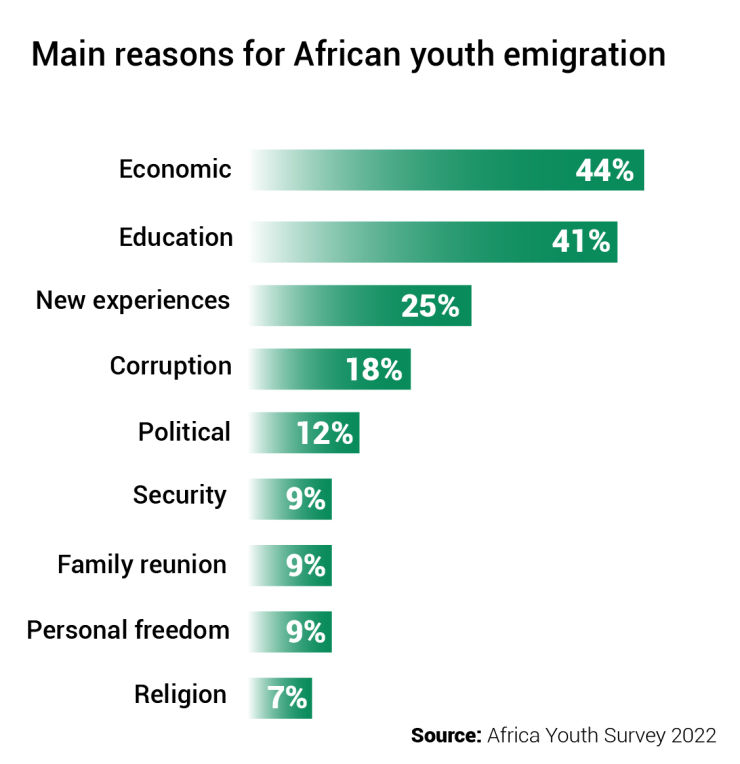
Although most would jump to the conclusion that Black Economic Empowerment (BEE) and positive discrimination in the workplace is causing this exodus of highly educated people seeking pastures greener, it may surprise that the survey scuppered that notion. In fact, the survey pointed out that the primary reason for the brain drain was for economic opportunities and that there was little evidence to suggest that the migration was driven by politics, race, or cultural assimilation, only 1.76% of respondents stated political issues as the reason for emigration.
Regardless of the reasons, one thing is certain and that is other external factors are leading to substantial imbalances between the demand for and supply of skills in South Africa. The requirement for internationally recognized university degrees is becoming mission-critical for a large percentage of South African graduates, but finding an or useful program to study, is proving harder and harder, especially programs that use a skills-based curriculum to allow people to walk into a job hard-baked and able to hit the ground running. Therefore, online universities such as └Ūėč╔ńŪ° are gaining increasing traction in the South African market right now as they serve up a tried and trusted competency-based curriculum.
Imbalances between the demand for and supply of skills
Within the labor market, skills supply is inevitably matched against the skills demand of the economy. In scenarios where skills supply and skills demand are aligned with each other, the education system is working. However, misalignment of skills supply and demand leads to skills imbalances that do need to be sorted out. The Organization for Economic Co-operation and Development (OECD) (2017b) distinguishes between three types of skills imbalances:
1. Skills shortages. This is where skills demand exceeds skills supply and is generally evident where employers are unable to find staff with the required skills in the labor market at the going rate of pay and under existing working conditions. 2. Skills surpluses. These occur when skills supply exceeds skills demand. Skills surpluses are characterized by a relatively high supply of but a low demand for a given skill and can be identified by high unemployment. 3. Skills mismatches. These can refer to the inadequacy of workersŌĆÖ skills relative to the requirements of the jobs they are currently in. Skills mismatches can be measured against qualification level, field of study, or competencies.
The types of imbalances identified through the considerations of supply relative to demand demonstrates precisely what needs to be done within the education and training systems, so that the marketŌĆÖs demand for skills can be met by a supply of sufficiently skilled workers.
Fastest growing sectors for employment in South Africa
South Africa is at a crossroads right now as certain industries are growing faster than the pipeline of skilled labor that can fulfil these jobs. In short, it is not just about finding people with the skill sets required to fill jobs in fast growing job sectors such as Information Technology, Finance, and Business Management, it is finding skilled labor in a market where there is an abundance of unskilled labour.
In South Africa this means that those unskilled laborers would have little to no chance of procuring the necessary skills to move out of their physically demanding jobs and into other sectors where they can put the necessary knowledge and skills to effective use to do their new jobs effectively. Upskilling will help them move up not just the career, but also the pay ladder.
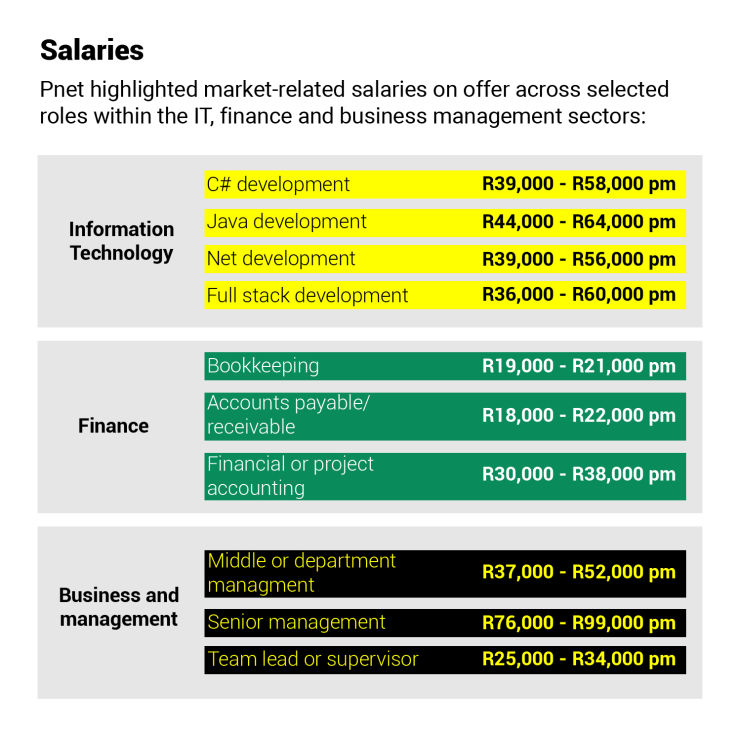
There is a clear emphasis on the demand for IT skills in the Western Cape and Gauteng regions. Across all regions, candidates with business and management expertise are highly sought after. Companies in all regions of the country require a relatively high amount of finance and admin as well as office and support staff. These are the main skills being sought across South Africa.
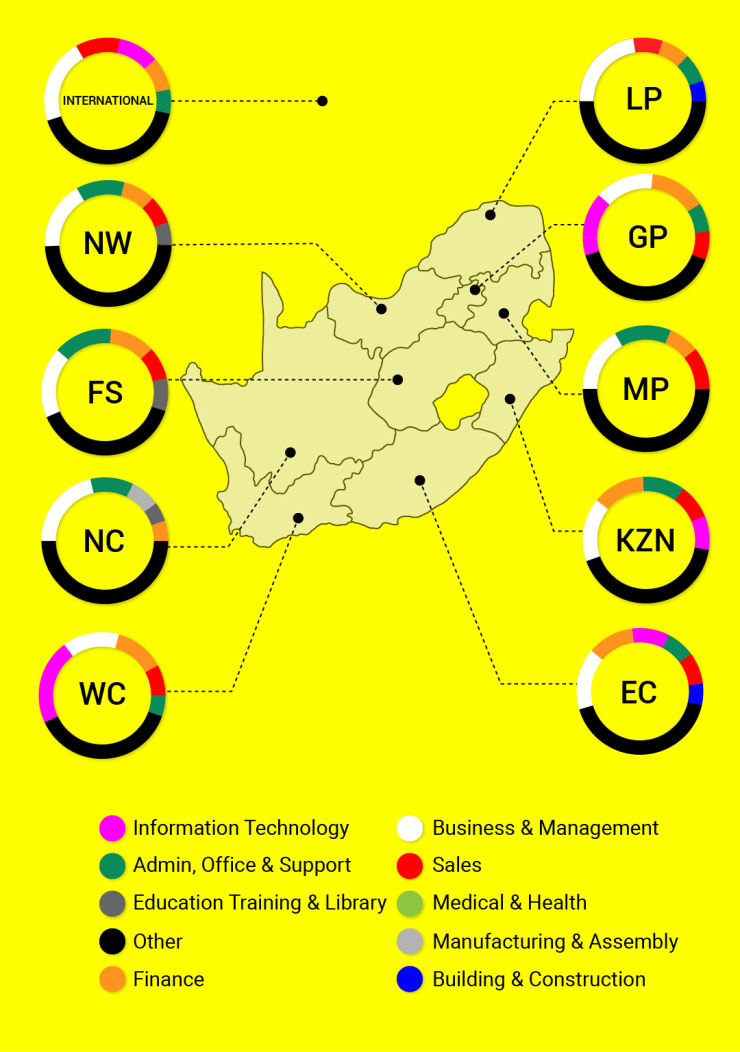
To create new jobs, the South African government must consider reindustrialization, both to grow the economy and reskill its workforce for jobs in an ever-growing automated environment. Automation is putting those individuals doing manually repetitive jobs on the endangered species list, and without the ability to upskill or reskill to survive and thrive in this modern job market, 35% of the present jobs in South Africa ŌĆō a further 5.7 million workers will be at risk of redundancy.
The government canŌĆÖt afford to let this happen as the unemployment rate in South Africa is amongst the highest in the world and has remained consistently high throughout the post-apartheid period. Currently, the overall unemployment rate is estimated at 34.9%, while 33.5% (3.5 million) of young people aged 15ŌĆō24 years are currently not in employment, education, or training.
Top 5 most in demand skills in the South African economy
Despite all the doom and gloom being bandied around in global economic circles, the South African economy surprisingly expanded 1.2% in the three months ending June 2022 with personal services, trade, manufacturing, and agriculture leading the charge. This however is a small segment of the verticals in the South African economy that are driving growth that all comes down to the most in-demand skills required right now.
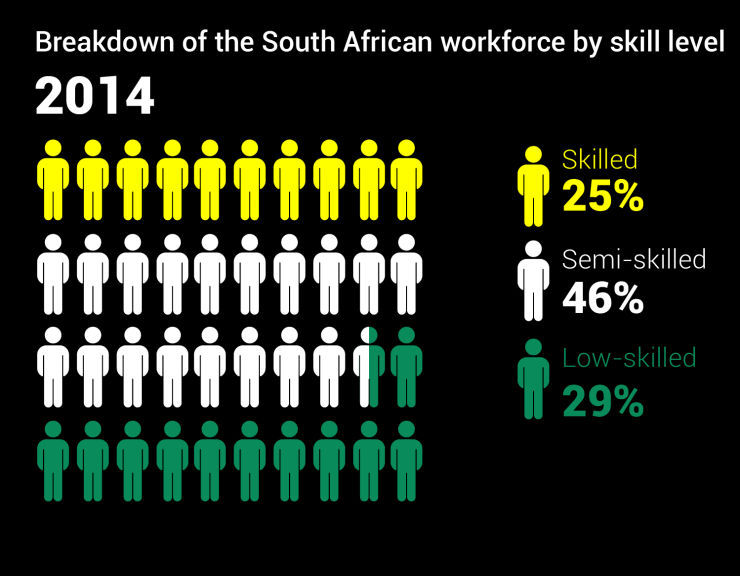
1. Software Development
Though relatively new to the digital world, South Africa has been an up-and-coming player in global tech markets for decades, and those businesses need developers. Specialized software development skills, frequently used by those who know their way around computer programs, are a growing commodity in the country and they will be in high demand into and beyond 2022.
2. Business Management
Communication, organization, and adaptability are the sub-skills required for any suitable business management position. Despite the 2020 pandemic, certain companies in Cape Town and Johannesburg are growing and on the hunt for talented people with an eye for detail to oversee their accounts. These opportunities will likely remain in high demand for the foreseeable future.
There was a rise in the employment of managers across all industries except manufacturing, construction, and private households. The increase was greatest for financial and business services (426% of the change in managers), CSP services (153%) and mining (58%).
Learn how to develop the most in-demand skills for your future career!
Discover how you can acquire the most in-demand skills with our free report, and open the doors to a successful career.╠²
3. Information Technology
As more people become online natives, the more data they leave behind in their wake. IT has and continues to lead the charge when it comes to careers that show the biggest likelihood for career progression. Although the vocation has been around for what seems like an eternity, interpreting data, and predicting consumer habits is an entire industry ŌĆō and those leaders will lead the charge in keeping the industry going.
4. Banking/High Finance
Banking and finance hubs are clustered in Johannesburg and Cape Town ŌĆō which are home to some of South AfricaŌĆÖs largest financial firms. Even though the damage to key global business markets happened in Africa and throughout the world in 2020, we are seeing a pleasing recovery. Thus, candidates with financial skills will be in high demand in 2021 and beyond.
5. Engineering
It would appear that every industry needs engineers and their highly sought-after skills. South Africa is no different. Solid engineering skills are highly sought after ŌĆō but especially within the infrastructure and environmental sectors. One of the most important skills engineers can have is solid problem-solving solutions, as well as superior resolve when encountering and overcoming humps in the road.
It is important to point out that the top 5 most in-demand skill does not represent all the emerging occupations and skills in South Africa. There are of course a host of others. Based on the World Economic Forum (WEF) data, the list of occupations and skills expected to increase in demand between 2020ŌĆō2024 in South Africa is presented in the table below.
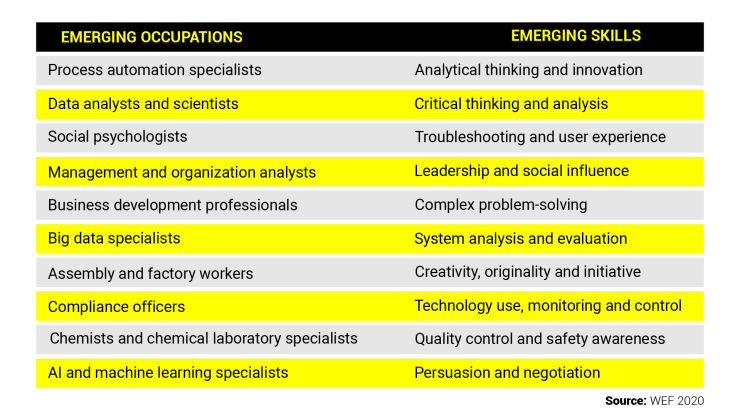
No surprise that emerging occupations have at their center highly skilled individuals. The list of emerging skills combine those related to technological occupations (e.g., technology use, monitoring, and control, troubleshooting and user experience) and senior management positions (e.g., complex problem-solving, persuasion and negotiation).
As we all know basic economics is made up of supply and demand. Whilst types of skills and amounts of skilled workers is on the rise in South Africa, there remains a fair-sized shortage of occupations that require skilled workers to plug the gaps. The below table sheds light on that.
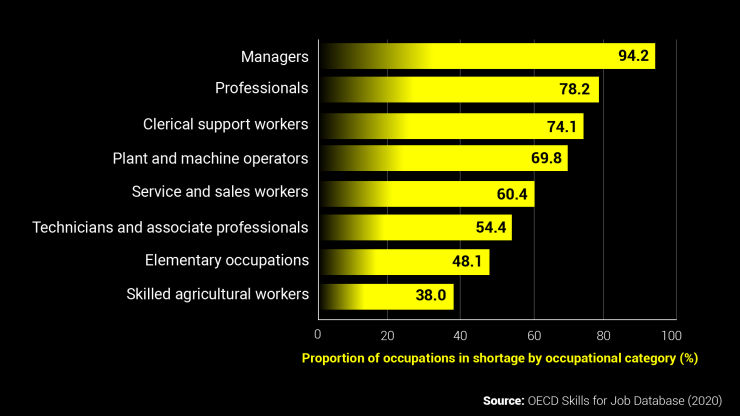
Education builds skills and improves job prospects
Former South African president, Nelson Mandela, once said, ŌĆ£Education is the most powerful weapon which you can use to change the world.ŌĆØ The world is one thing but starting closer to home and addressing the education challenges is something that the South African government must address with actions that represent a major overhaul of the domestic education system. This is especially true when it comes to higher education.
Continued progress within the schooling system is important for the government to ensure that learners can successfully move through the skills pipeline. The provision of a strong foundational education level in both schools and very importantly universities, is essential for the success of learners while in the education system. This, in turn, will help to improve the number of candidates and their skills levels as they leave the educational system and enter the labor market.
Quality educations influences the labor supply by permitting people with necessary qualifications and skills to succeed. Educational qualifications demonstrate to employers exactly what the employeeŌĆÖs abilities extend to. Education and training have a direct correlation with economic growth as it leads to a more productive workforce and higher standards of output.
The education levels of the labor force in South Africa increased on average between Q2 2018 and Q2 2021. However, the average level of educational attainment remains low. Among the employed, 12.2% have a degree, 10.8% have a diploma or certificate, and a shocking 34.4% have completed secondary schooling. Over two-fifths of the employed (41.8%) have not completed secondary schooling. This amounts to 6.2 million un-skilled labor individuals, as of Q2 2021.
It is those with fewer skills and lower levels of education provide significant barriers to individuals entering the formal labor market and, as a result, the informal sector, such as the black taxi industry, will play a key role in providing income earning prospects.
Are you ready to take your career to the next level?
└Ūėč╔ńŪ°'s Career Path Planner takes into account your experience and interests to provide you with a customized roadmap to success.
Receive personalized advice on the skills and qualifications you need to get ahead in areas like finance, marketing, management and entrepreneurship.
Higher education opens more doors in the South African job market
Times Higher Education says that with South Africa facing record unemployment levels, the countryŌĆÖs universities are going to have to step up to the plate and deliver graduates that are ready to meet the demands of the modern industry.
The publication goes on to say, ŌĆśWorking with industry on curricula design and embedding the skills needed ŌĆ£beyond the classroomŌĆØ can help South African universities improve graduate employability and boost regional investment.ŌĆÖ
Chair Ashton Wenborn, special projects deputy editor at Times Higher Education, said South Africa was facing a period of record high unemployment. She also said universities could tackle this issue by ensuring their students are taught the skills they need to become employable graduates.
Further adding to the quandary, Brenda Martin, director of the careers service at the University of Cape Town said it was important to understand higher education institutions had not traditionally been places where skills were the focus. ŌĆ£More recently, thereŌĆÖs been recognition of things like interdisciplinary skills that are valuable in terms of enhancing employability,ŌĆØ she said. ŌĆ£And thereŌĆÖs also been a recognition of the need to think about skills right from year one.ŌĆØ
, └Ūėč╔ńŪ°ŌĆÖs Founder and CEO went on to talk further about the skills shortage that is plaguing the global and African workplace where graduates are being sent out into the workplace filled with theory and not crucial skills. He said, ŌĆ£Next-generation educational institutions like └Ūėč╔ńŪ° can function as a corrective to realign employer needs and workersŌĆÖ skills. We can help learners to hit the ground running by teaching skills over theory.ŌĆØ
In addition to the National Development Plan 2030, the South African Department of Higher Education and Training is now focusing on implementing policies for student financial aid, providing students and teaching staff with more opportunities for access to higher education and success and also strengthening the governance of the community education and training sector.
Due to socio-economic factors in South Africa, cost is one of the biggest obstacles to school leavers getting a degree of any form. This is why 100% online universities like └Ūėč╔ńŪ° are becoming ever popular in markets such as South Africa, Ghana, and Kenya. With pay-as-you-go monthly payments, learners can take control of their finances and not have to end up with massive student debt hanging round their necks when they do enter the workplace.
The other obstacle of access to necessary higher education is the cost of travel and limited access to accommodation in the neighborhood of traditional universities. With 100% online flexible learning, people can learn from home or anywhere else they may find themselves and also very importantly, learn and earn at the same time.
These are definitely some of many reasons why growing numbers of are putting their faith in conducting their studies at └Ūėč╔ńŪ° as a means to earning an MBA or BBA degree that is more than just three letters.
╠²
Ready to take the next step? Download our brochure or book a call with our └Ūėč╔ńŪ° Advisors!

Mark is a college graduate with Honours in Copywriting. He is the Content Marketing Manager at └Ūėč╔ńŪ°, creating engaging, thought-provoking, and action-oriented content.
Join our newsletter and be the first to receive news about our programs, events and articles.